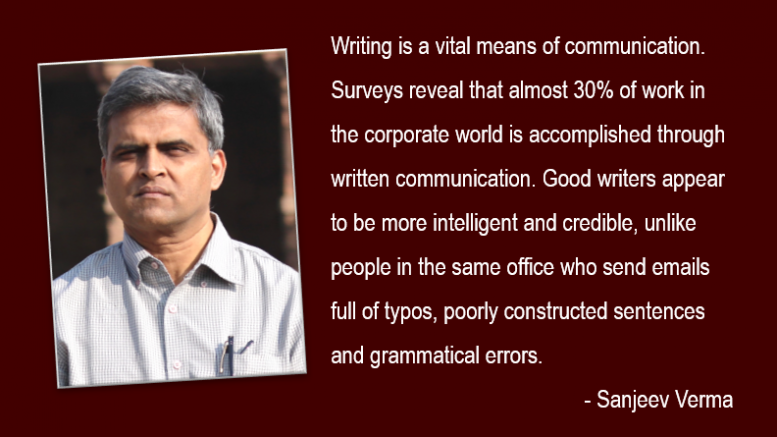Is it all right to spell all right as alright? Infer and imply, do they mean the same thing? Are media singular or plural? Do you cite an example, or do you site it? Hot button, surely, is an emotional, divisive controversy, not a hot topic. Rein has nothing to do with a monarch; only with controlling a horse. You can toe a line but try never to tow it. And, you know, it was a gripping film all right but you were not literally glued to your seat. Unless there was adhesive substance on that seat before you settled into it.
In everyday situations it is perhaps all right not to worry too much about these mistakes but that doesn’t extend to professional business communication; you must be precise and correct, if not eloquent.
Writing is the vital means of communication within an organisation. In fact, surveys have revealed that almost 30 per cent of work in the corporate world is accomplished through written communication. Besides, countless careers have failed, and flailed, because of a limited ability to communicate well through writing. Writing savants, on the other hand, have always prospered.
Writing skills matter. Good writers appear to be more intelligent and credible, unlike people in the same office who send emails full of typos, poorly constructed sentences and grammatical errors. So, it’s time to accept that your ability to write a succinct email, or to effectively summarise a meeting in a memo, or to write a clear-headed thought leadership article could determine your route to professional success.
So, what can you do to write better? Let me offer half-a-dozen pointers.
- Eschew obfuscation. So said Ernest Hemingway, the American novelist and short story writer. Asked to advise people how to write effectively, Hemingway said all that was needed was for writers to eschew obfuscation. Eschew is to avoid or abstain; obfuscation is to make something unclear or unintelligible. So, Hemingway’s sage counsel for aspiring writers: be clear. And you can only be clear if you are simple.
- Write short sentences and use smaller words. Avoid the florid prose. Keep your sentences short. And use smaller words. Excise utilise—it says nothing that use doesn’t. Next, not subsequent. Strike out commensurate, use equal. Expeditious will get you nowhere, fast will do. And proximity just means close and not much else.
- Always plan what you are going to write. Make a bullet-ed list of four or five points you want to cover in your document, and elaborate each one of them. That’s your document.
- Get to the point immediately. That’s one of the diseases of writing—to postpone the main message to the middle of the proceedings. Especially that’s a disease that afflicts business writers. Wrong. Begin with your main point. Don’t waffle. No one wants to read your stream of consciousness. If you have something that can get my attention, bring it on. Now.
- Revise. Revise obsessively. First drafts are often terrible but many revisions later all the creases in the writing are gone. You’ve fixed them. Hemingway rewrote the ending to A Farewell to Arms 39 times. An interviewer asked the great American writer what had stumped him so much that 39 rewrites were required. “Nothing much,” he said, “I was just trying to find the right words.”
- Avoid spelling and syntax errors. They are like stains on a shirt. No matter how expensive that white shirt you are wearing is, the ugly stain is all that people are noticing. You will ruin a well-positioned piece of writing by making a couple of careless errors in the opening paragraph. Thereon, mate, it’s all downhill.
Good writing often is just about keeping it simple. With care and common sense business communicators can write clearly and confidently.
The views expressed here are that of the author and do not necessarily reflect that of Reputation Today.





Much needed guidelines for writers of today Thank you Jeeves